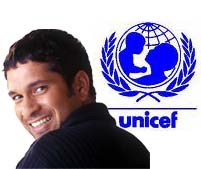Tendulkar goes to bat for UNICEF
 NEW DELHI, 3 October 2008 – International cricket sensation Sachin Tendulkar has joined forces with UNICEF to get Indian children to wash their hands for better health and hygiene as part of the first ever Global Handwashing Day 15 October.
NEW DELHI, 3 October 2008 – International cricket sensation Sachin Tendulkar has joined forces with UNICEF to get Indian children to wash their hands for better health and hygiene as part of the first ever Global Handwashing Day 15 October.
Tendulkar is featured in a public service announcement that will broadcast this month in 14 languages on television channels across the country to drum up support for the campaign targeting students in more than six million schools across India.
“Having a celebrity of this magnitude, who is instantly recognizable to cricket fans not only in India but around the world, will help us mobilize millions of young people,” said Karin Hulshof, UNICEF Representative in India. “Lending free-of-charge his image to promote handwashing with soap will undoubtedly save many children’s lives.”
Known as the “Master Blaster,” Tendulkar is widely acknowledged as one of the greatest batsmen in the history of the game. He is the first player to score 10,000 runs in one-day internationals, and is among only three batsmen, and the first Indian, to surpass 11,000 runs in test cricket.
UNICEF India has a longstanding relationship with BCCI, the Board of Control for Cricket in India, dating back to 1986 when players came out to support and promote polio prevention.
“Having two young children, I constantly have to remind them to wash their hands before and after meals,” Tendulkar said. “I wanted to be a part of this campaign, because washing hands with soap can keep children safe and healthy and protect them against deadly disease.”
The Indian campaign is part of a global movement uniting millions of children in 52 countries across five continents as part of the International Year of Sanitation 2008. Nearly half of the world’s population, or 2.6 billion people, to not have access to adequate sanitation. This dire situation has widespread implications on human health, child survival, economic productivity and pollution of living spaces and water resources.
Washing hands with soap is one of the most cost-effective health measures to prevent diarrhoea, the second biggest killer of children in India. Proper handwashing can reduce diarrhoeal cases by 47 per cent and acute respiratory illnesses by 30 per cent.
This campaign highlights the need to wash hands with soap before meals and after defecation. Human excreta is the essence of the sanitation challenge. One gram of faeces can contain 10 million viruses, 1 million bacteria, 1,000 parasite cysts and 100 parasite eggs.
Washing hands and using toilets properly impacts not only health, but also education. The sanitation coverage in Indian schools is estimated to be about 58 per cent. However, providing private and separate sanitary latrines in school can increase girls’ enrolment by 11 per cent. Proper sanitation facilities in schools can drastically improve the chances of a girl finishing her education. Currently, only 34 per cent of India’s girls are completing their schooling.
World Governments, including the Government of India, have agreed to eight Millennium Development Goals (MDGs) to reach targets addressing extreme poverty. Goal seven aims to reduce by half the number of people without access to sanitation by 2015. About 54 per cent of India’s rural population has access to toilets, according to Government of India data. More than half a billion people practice open defecation.
To meet this challenge, the Government of India has launched major efforts to promote household and school sanitation through its Total Sanitation Campaign.
“UNICEF is an essential partner in our efforts to meet the Millennium Development Goals,” said Dr. Raghuvansh Prasad Singh, Minister of Rural Development. “We know that improved sanitation is an essential element to improve the health and welfare of our nation’s children.” (ANI)